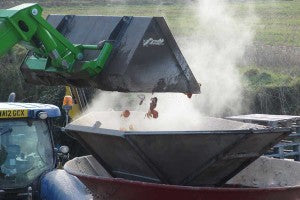A load of scallops!

Mr Haddock, who runs a successful farm shop as well as a waste recycling business, is setting up a new business turning 100,000t/year of unwanted scallop shells into a soil improver.
He explains that, every year, the fishing industry is left with huge quantities of scallop shells as an unwanted by-product.
The shells cannot be thrown back into the sea and, until now, fishermen have had to pay up to £350/t to have them dumped in landfill sites. Alternatively, they are shipped to Scotland for building tracks through pine forests.
Mr Haddock said he had spent four years trialing the use of crushed shell as a fertiliser and had seen good results on his own farm.
He has been able to stop using artificial fertiliser on his grassland altogether, getting good results from using a combination of farm manure and shell crushed into a powder.
The shell is applied in granular form to his arable ground, along with a limited amount of bagged fertiliser, and trial analysis due later this year is expected to confirm increases in barley yields as a result.
"It's already winning on two fronts - taking costs out of production for both fishermen and farmers," he said.
"The additional bonus is that the product is entirely organic, which broadens its appeal immensely, and which is why we are already getting inquiries from organic growers across the country."
"There's huge pressure on both these important West Country sectors at the moment, and anything that can be done to remove costs is going to make them more capable of surviving in their own very tough trading environments."
The soil improver will be officially launched later in the year but it is unclear, at this juncture, if an amenity version is in the pipeline.
Read the original article from Farmers Weekly HERE
